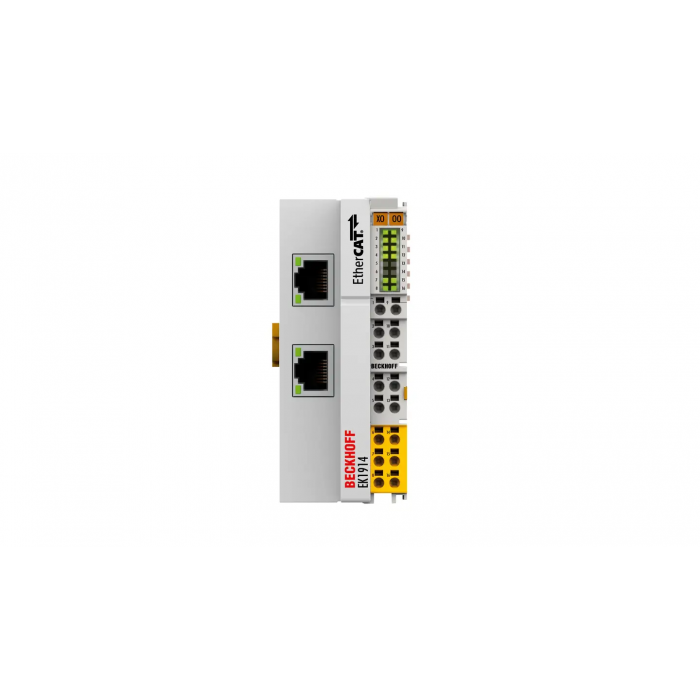Back to Top
EtherCAT Coupler EK1914
Connection technology: 1-/2-wire
Specification: EtherCAT Coupler with standard and safety I/Os
Number of inputs: 6 digital inputs, 2 of which are fail-safe inputs
Number of outputs: 6 digital outputs, 2 of which are fail-safe outputs
Max. output current: per standard output: 0.5 A,
per safe output: 0.5 A, min. 20 mA
Protocol: EtherCAT
Fault response time: ≤ watchdog time
Installation position: horizontal
Safety standard: DIN EN ISO 13849-1: 2008 (Cat. 4, PL e)
Weight: approx. 123 g
IP protection rating: IP20
Design form: HD (High Density) housing with signal LEDs
Material: polycarbonate
Dimensions (W x H x D): 44 mm x 100 mm x 67 mm
Installation: on 35 mm DIN rail, conforming to EN 60715 with lock
Side by side mounting by means of: double slot and key connection
Marking: labeling of the BZxxx series
Wiring: solid conductors (e): direct plug-in technique; fine-stranded conductors (f) and ferrule (a): spring actuation by screwdriver
Connection cross-section: s*: 0.08…1.5 mm²,
st*: 0.25…1.5 mm²,
f*: 0.14…0.75 mm²
Connection cross-section AWG: s*: AWG 28…16,
st*: AWG 22…16,
f*: AWG 26…19
Stripping length: 8…9 mm
Current load power contacts: Imax: 10 A
The EK1914 EtherCAT coupler combines the functionalities of the EK1100 EtherCAT coupler with standard and safe digital I/Os. This results in a compact design that is especially suitable for applications with a low number of I/Os.
Like the EK1100, the EK1914 can be extended with all EL/ES terminals. The EK1914 has four digital inputs and four digital outputs, as well as two fail-safe inputs and two fail-safe outputs. The safe input and output signals are exchanged with a TwinSAFE Logic-capable component via FSoE.
The EK1914 has safety parameters to adapt the functionality specifically to the respective safety-oriented requirements (e.g., 1-channel evaluation vs. 2-channel evaluation of the inputs, testing of the individual channels).
In addition, standard outputs can be activated for the EK1914. As a result, corresponding standard outputs are available in parallel with and internally ANDed with the safe outputs of the EK1914. The safe output signals, which are controlled by a TwinSAFE Logic, thus issue the safe release for the standard signals, which can then be triggered by the non-safety oriented control system independently of the cycle of the safety controller and FSoE. This allows faster switching times of the outputs, provided that the safety controller issues the necessary release for the output.
The safety parameters are not stored directly on the component, but are transmitted to the input terminal via a TwinSAFE Logic-capable component when the safety application is started. This simplifies service procedures, because in this case the component can simply be replaced. The safety-relevant parameters are transferred to the new component when the safety application is restarted.
Special features:
EtherCAT coupler with integrated I/Os (standard and safety)
two safe inputs
two safe outputs
cross-circuit detection
1-channel vs. 2-channel evaluation directly on the component
testing of the input channels can be activated individually
Standard outputs can be activated with integrated ANDing with a safe output signal
The EK1914 EtherCAT coupler combines the functionalities of the EK1100 EtherCAT coupler with standard and safe digital I/Os. This results in a compact design that is especially suitable for applications with a low number of I/Os.
Like the EK1100, the EK1914 can be extended with all EL/ES terminals. The EK1914 has four digital inputs and four digital outputs, as well as two fail-safe inputs and two fail-safe outputs. The safe input and output signals are exchanged with a TwinSAFE Logic-capable component via FSoE.
The EK1914 has safety parameters to adapt the functionality specifically to the respective safety-oriented requirements (e.g., 1-channel evaluation vs. 2-channel evaluation of the inputs, testing of the individual channels).
In addition, standard outputs can be activated for the EK1914. As a result, corresponding standard outputs are available in parallel with and internally ANDed with the safe outputs of the EK1914. The safe output signals, which are controlled by a TwinSAFE Logic, thus issue the safe release for the standard signals, which can then be triggered by the non-safety oriented control system independently of the cycle of the safety controller and FSoE. This allows faster switching times of the outputs, provided that the safety controller issues the necessary release for the output.
The safety parameters are not stored directly on the component, but are transmitted to the input terminal via a TwinSAFE Logic-capable component when the safety application is started. This simplifies service procedures, because in this case the component can simply be replaced. The safety-relevant parameters are transferred to the new component when the safety application is restarted.
Special features:
EtherCAT coupler with integrated I/Os (standard and safety)
two safe inputs
two safe outputs
cross-circuit detection
1-channel vs. 2-channel evaluation directly on the component
testing of the input channels can be activated individually
Standard outputs can be activated with integrated ANDing with a safe output signal
| SKU | EK1914 |
|---|
Write Your Own Review
Write your content here...


